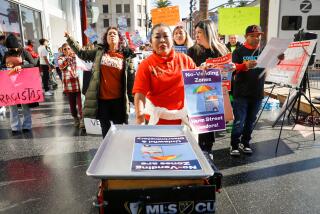Anaheim Plan Spurs More Objections : Vendor Proposal Action Delayed Again
A proposal to regulate Anaheim’s street vendors made yet another encore before the City Council on Tuesday, and, as before, opposition prompted the council to postpone action.
This time, the council delayed a decision for two weeks to review a list of recommendations by the Chamber of Commerce.
Anaheim Code Enforcement Supervisor John Poole has been working for months on the proposal, but truck-catering services have objected, as have Latino vendors and activists, who claim the proposal favors large companies over individual street sellers. Under the current proposal, only motorized vehicles would be allowed--which, in effect, bans the paleteros , who sell frozen fruit bars from pushcarts and are a common sight in Latino neighborhoods.
The chamber has recommended that the type of vending done by such companies as the Anaheim-based Orange County Food Service be exempted from proposed regulations. That truck-catering service visits more than 950 businesses daily.
The chamber recommended that vendors selling “to the employees of a business located at a permanent location at times arranged in advance with the management” should not be regulated, nor should vendors in residential, commercial and industrial construction areas.
The chamber also asked that the council allow sale hours to begin two hours earlier--at 7 a.m.; to allow vendors to remain at one location for 30 minutes rather than 10, and to permit amplified sound, music, horns and other devices to attract customers.
The chamber also asked that vending be allowed from non-motorized vehicles, a plea made months earlier by Latino representatives.
Amin David, president of Los Amigos of Orange County who earlier this summer criticized the council for ignoring its Latin community, said Tuesday that he was pleased with the chamber’s involvement--”even though they did it so late in the game.”
Poole said Tuesday that he will consider all the recommendations before making yet another report to the council. The only amendment he has agreed to for now, he said, is lowering the proposed insurance requirement. Originally, he recommended to the council that each vendor carry $1 million in liability insurance. The chamber’s report recommends a maximum of $500,000 for general liability coverage.
More to Read
Sign up for Essential California
The most important California stories and recommendations in your inbox every morning.
You may occasionally receive promotional content from the Los Angeles Times.










